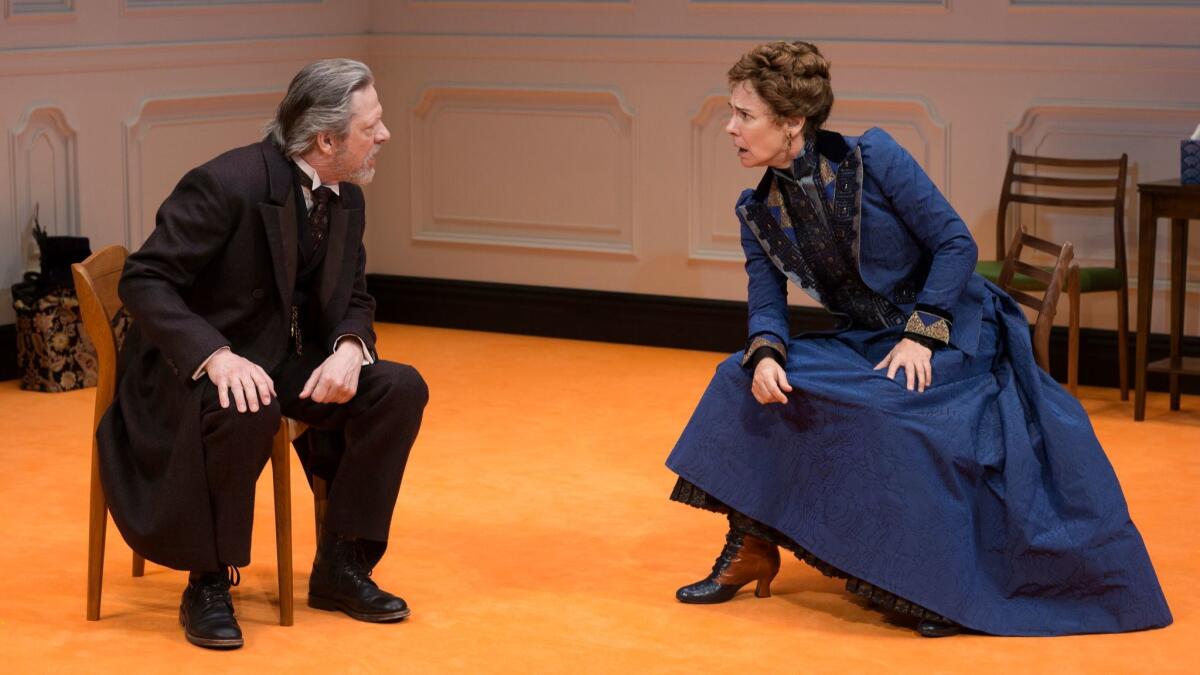Criticâs Notebook: Oh, the dreaded intermission: Long plays at a time when shorter is sweeter

Recently while scrolling through Facebook, I came across the lament of a playwright who was distressed that the new play he was writing seemed to require an intermission. I had no personal knowledge of the author, but I instantly recognized the sentiment.
The vogue for shorter plays is undeniable. Ask me while stuck in traffic on my way to the Mark Taper Forum or the Geffen Playhouse what my favorite dramatic genre is and Iâll likely say, â90 minutes, no intermission.â
Donât judge me. Iâve seen more revivals of âLong Dayâs Journey Into Nightâ than episodes of âFriends.â I am a devoted student of Shakespeare, whose plays are spread over five long acts. And some of the greatest highs Iâve had in a theater have come from Wagnerian operas that threatened to never end.
But there are times when an usher informs me that the new play Iâm about to see is 2 ½ hours long and I feel like an animal whose cage door is being slammed.
Theatergoing, like air travel today, is expensive without being luxurious. Where has common-sense etiquette gone? The other day a woman seated next to me spent the first 15 minutes of the show trying to figure out how to turn off her blindingly bright phone.
But Iâm not here to complain about crinkling candy wrappers or the acoustical battles between hearing aids and assisted listening devices. My concern is an art form that doesnât always seem in sync with modern life. Plays without intermissions may be gaining in popularity, but the convention of two acts separated by 15-minutes of lobby dithering is still deeply entrenched. An assumption persists that longer works have more range and ambition, as if depth were a function of backside penance.
Anyone who has read the ancient Greek tragedians, Samuel Beckett or Caryl Churchill knows what can be achieved in an unbroken act of inexorable drama. But itâs in the more pretentious reaches of the commercial theater â the haute middlebrow, if you will â that mid-20th century Broadway traditions are still the default.
The stretching out of plays by intermissions might make sense for producers worried about the sales revenue of overpriced food and drink. But the practice is a holdout from an era when people had discrete work hours, less harried commutes and minds that were free of Facebook, Twitter and email nudges.
Here are a few of the reasons I hate intermissions: They force you to make dinner reservations that are either too early or too late; they add to the already maddening crowd control problems; they disrupt the dramatic flow; and, perhaps most important of all, they encourage playwrights to pad rather than to hone their works.
My concern is an art form that doesnât always seem in sync with modern life.
Lynn Nottageâs âSweatâ won the Pulitzer Prize for drama this year, but I wonder if her politically prescient play about disaffected factory workers in Pennsylvania would have had a longer life on Broadway had a moratorium on intermissions compelled the author to tighten the expositional sprawl.
Another Broadway drama from last season that would have benefited from some aggressive pruning was Joshua Harmonâs âSignificant Other.â The play, which will be at the Geffen next year, explores the clash between modern values and inherited traditions in a story about a single gay man who feels increasingly alienated as, one by one, his female friends get married.
Despite the insouciant wit, ironic intelligence and wounded heart, âSignificant Otherâ didnât earn its two hours and 20 minutes of stage time. Somewhere lost in the overgrowth was a memorable 85-minute comedy capable of reaching its poignant conclusion without needless repetition or delay. The play might have increased its odds of becoming a modest Broadway hit had it, in its move from off-Broadway, surgically removed its intermission â a procedure that worked wonders for the Todd Almond-Matthew Sweet musical âGirlfriendâ in its evolution from Berkeley Rep to the Kirk Douglas Theatre.
In the prologue to âRomeo and Juliet,â the chorus tells the audience that the tale will unfold within âthe two hoursâ traffic of our stage.â Rarely, however, is this promise kept in contemporary revivals, which can tack on another 45 minutes with dillydallying set changes and loose intermissions. (Corralling people back from the lounge these days requires a bouncerâs vocal brawn.) Shakespeareâs instincts, however, shouldnât be second-guessed. âHamletâ and âKing Learâ might not fit within these confines, but most theatrical stories comfortably can.
Hold your letters, readers. Iâm aware that intermissions provide a convenient bathroom break. But we sit readily through films lasting two hours, and intermissions in musicals donât always come before the 90-minute mark. When nature calls, she calls, and Iâve never in my years of theatergoing felt any outrage in having to let a fellow audience member scoot by me during a show. People get sick. Some are overwhelmed by boredom or personal worry. Others may just hate what theyâre watching. Itâs a free country. Everyone has the right to get up and leave at will.
Letâs not permit restroom business to blind us to the obvious truth that intensity is more alluring in our age of distraction than extended duration. But Iâm not asking artists to capitulate to the demands of our ever-shrinking attention spans. I would like them, however, to think harder about the relationship between fictive and real time.
Aristotle tells us in âPoeticsâ that tragedy begins with an action âthat is complete and whole and has some magnitude.â Size matters. But plots that are too long are as ill-advised as those that are too short. âThey should have length, but such that they are easy to rememberâ is the rule Aristotle prescribes.
Ultimately itâs the scale of experience, not the hours clocked, that matters most. What is the dramatist asking a protagonist or set of characters to undergo? Edward Albee wrote plays that were as compact as âThe Zoo Storyâ and as prolonged as âWhoâs Afraid of Virginia Woolf?â He disliked the label âfull-lengthâ to describe the longer works because he believed that even his most diminutive one-acts were complete and whole and of sufficient magnitude.
I share his undogmatic view of dramatic lengths, but too often it seems that playwrights are conforming to a format that is not in the service of their own storytelling. Whenever an intermission occurs before anything meaningful has taken place, I know that a producing template is dictating the narrative form.
This discussion, it should be noted, has been happening since the dawn of the modern theater. In his indelible preface to his 1888 masterpiece âMiss Julie,â August Strindberg felt confident that his new 90-minute work would be palatable to modern sensibilities âsince people can listen to a lecture, a sermon or a conference session for that length of time or even longer.â But he looked forward to an era when an audience would be âso educated that it could sit through a single act lasting an entire evening,â though he knew that this would ârequire some preliminary experimentation.â
The research and development that Strindberg pursued more than a century ago needs to press on. Iâm happy to see Broadway has been playing with start times and been more open to presenting work that gets the job done as efficiently and expertly as Lucas Hnathâs lean âA Dollâs House, Part 2.â

SIGN UP for the free Essential Arts & Culture newsletter Âť
Less isnât always more, but more for the sake of more is invariably a trudge. I have no beef against epic work. Next week Iâll be taking a busmanâs holiday to London, where Iâll be devoting a full day to the National Theatreâs production of Tony Kushnerâs âAngels in America.â Iâll also be seeing Jez Butterworthâs highly praised âThe Ferryman,â which has a running time of (gulp!) three hours and 15 minutes.
Good work can stretch on until the crack of doom. (My favorite novel, Proustâs âIn Search of Lost Time,â does just that.) I donât know how well my stamina will hold up for Taylor Macâs âA 24-Decade History of Popular Musicâ when UCLAâs Center for the Art of Performance presents the marathon at the Theatre at Ace Hotel next year, but I wouldnât miss sampling it.
J.T. Rogersâ three-hour âOslo,â which won the Tony Award for best play this year, would probably have nabbed my vote. I confess that halfway through the production at
Playwrights are entitled to take it slow when slowness is integral to their vision. Annie Bakerâs microscopic focus on the telltale incidentals of human behavior in âThe Flickâ and âJohnâ (which makes innovative scripted use of its second intermission) may have tested the patience of some theatergoers, but style and substance are perfectly aligned.
In her most recent offering, âThe Antipodes,â Baker trapped the audience in a writers room for the entirety of a play that would have betrayed itself by stopping for a comfort break. The running time, a few minutes shy of Shakespeareâs two hoursâ stage traffic, challenged bladders but made dramatic sense. The cabin fever of these salaried scribes (directly experienced by theatergoers) was intrinsic to the workâs pressurized meaning.
âRemorse for the brevity of a Book is a rare emotion," Emily Dickinson sagaciously observed. These words lend themselves readily to contemporary plays. But itâs the laxity in artistic purpose, not the length of the writing, that makes us wish playwrights would be more conscientious in how they use that most precious gift of time.
Follow me @charlesmcnulty
MORE THEATER NEWS AND REVIEWS:
Review: âConstellationsâ at the Geffen
Interview: Allen Leech and Ginnifer Goodwin on the mind-bend that is 'Constellations'
Interview: An overnight sensation after 45 years in the biz: Denis Arndt in 'Heisenberg'
Review: A theater criticâs letter to the creator of 'Letters From a Nut'
Review: A Christian conservative baker, a gay wedding and a delicious 'Cake'
The biggest entertainment stories
Get our big stories about Hollywood, film, television, music, arts, culture and more right in your inbox as soon as they publish.
You may occasionally receive promotional content from the Los Angeles Times.








